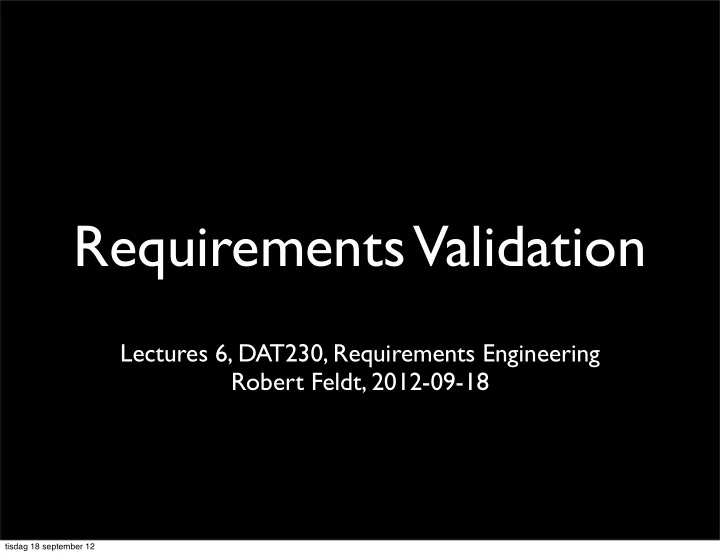

Requirements Validation Lectures 6, DAT230, Requirements Engineering Robert Feldt, 2012-09-18 tisdag 18 september 12
Recap from last lecture tisdag 18 september 12
Recap • Specification to refine/specify reqs and reduce risks • SRS is primarily a communication device • Also drives development and is baseline for releases • Modeling for specific situations and reqs • Many different specification techniques • Text, Sequence- and state-based models are key • Use cases, scenarios also quite common • Formal approaches less used; user communication harder • IEEE 830 gives basic and common structure tisdag 18 september 12
Specification Techniques Word doc Scenario State transition Use case Excel doc diagram Storyboard DB / Req tool Stimulus-response UML state diagram sequence Interaction- / Text State-based Sequence-based Decision tables Decision trees Text UI standards PLanguage Volere Prototype Decision-based Sketches Probabilistic Look’n’feel Quality Patterns samples CSP Z VDM Quality User Property-based Requirements Interfaces Formal tisdag 18 september 12
Why validation? “If temperature is higher than 70 and less than 100, then output should be 3000 watts” tisdag 18 september 12
Why validation? “If temperature is higher than 70 and less than 100, then output should be 3000 watts” • What if <70? tisdag 18 september 12
Why validation? “If temperature is higher than 70 and less than 100, then output should be 3000 watts” • What if <70? • What if >100 tisdag 18 september 12
Why validation? “If temperature is higher than 70 and less than 100, then output should be 3000 watts” • What if <70? • What if >100 • 70 and 100 are in C or F? tisdag 18 september 12
Why validation? “If temperature is higher than 70 and less than 100, then output should be 3000 watts” • What if <70? • What if >100 • 70 and 100 are in C or F? • How does this fit with rest? Conflicts? tisdag 18 september 12
Why validation? “If temperature is higher than 70 and less than 100, then output should be 3000 watts” • What if <70? • What if >100 • 70 and 100 are in C or F? • How does this fit with rest? Conflicts? • What is missing? tisdag 18 september 12
Validation Techniques tisdag 18 september 12
Req Review tisdag 18 september 12
The Review Formality Spectrum Pair Formal / Fagan Ad Hoc Review Programming Inspection Peer Desk Team Review Check No rules! Formal tisdag 18 september 12
The Review Formality Spectrum 7 Stages Roles Preparation Recorder Approval/Not Pair Formal / Fagan Ad Hoc Review Programming Inspection Peer Desk Team Review Check No rules! Formal tisdag 18 september 12
Fagan Inspection Process IBM: 80-90% of defects found & 25% resource savings [Wikipedia2011] tisdag 18 september 12
Review/Reading Styles • Test-Case Driven Review • Tester does review to find reqs that are not testable • Reading techniques • Ad hoc (most common, focused on experience) • Check-list based • Perspective-based (different stakeholders or user types) tisdag 18 september 12
Checklist example tisdag 18 september 12
Selective Homeworkless Review • Challenges when re-introducing Fagan inspections at IBM: • Managers: High up-front cost (20-30% of dev time), since everything reviewed => Selective reviewing • Individuals: Preparations seldom happen, since tight schedules => Homeworkless reviews • Team meets once a week, fixed day&time, 1-1.5 hours • Artifact selected just before or at meeting • Roles: Moderator, Reader, Scribe/Recorder • Hybrid: No preparation => informal, Roles => formal • Moderator selects specific review technique [Farchi2008] tisdag 18 september 12
Selective Homeworkless Review tisdag 18 september 12
Selective Homeworkless Review • Moderator monitors metrics: • Issues found per reviewer per hour • If below 2, then stop meeting or use other technique • Does it work? • 2.17 +/- 0.34 issues/hour/reviewer (90% confidence level) • “When compared to other review methodologies that in- clude preparation, our method finds fewer issues overall but more major issues per hour. Our opinion is that people working on their own are more effective in finding low-level syntactic problems, as more eyes are watching more places, but less effective in finding real bugs as the understanding is shallower.” [Farchi2008] tisdag 18 september 12
Prototyping tisdag 18 september 12
Prototyping tisdag 18 september 12
What do industry use? 4 companies used checklist-based and 2 ad hoc review reading 6 used throwaway prototypes, 2 also evolutionary tisdag 18 september 12
Who do industry involve in reviews? tisdag 18 september 12
Pros/Cons of Reviews? tisdag 18 september 12
Improvements to Reviews? tisdag 18 september 12
Satisfaction with Prototyping? tisdag 18 september 12
Comparison of Techniques tisdag 18 september 12
Standards & Process Reqs tisdag 18 september 12
Standards & Process Reqs tisdag 18 september 12
Recommend
More recommend